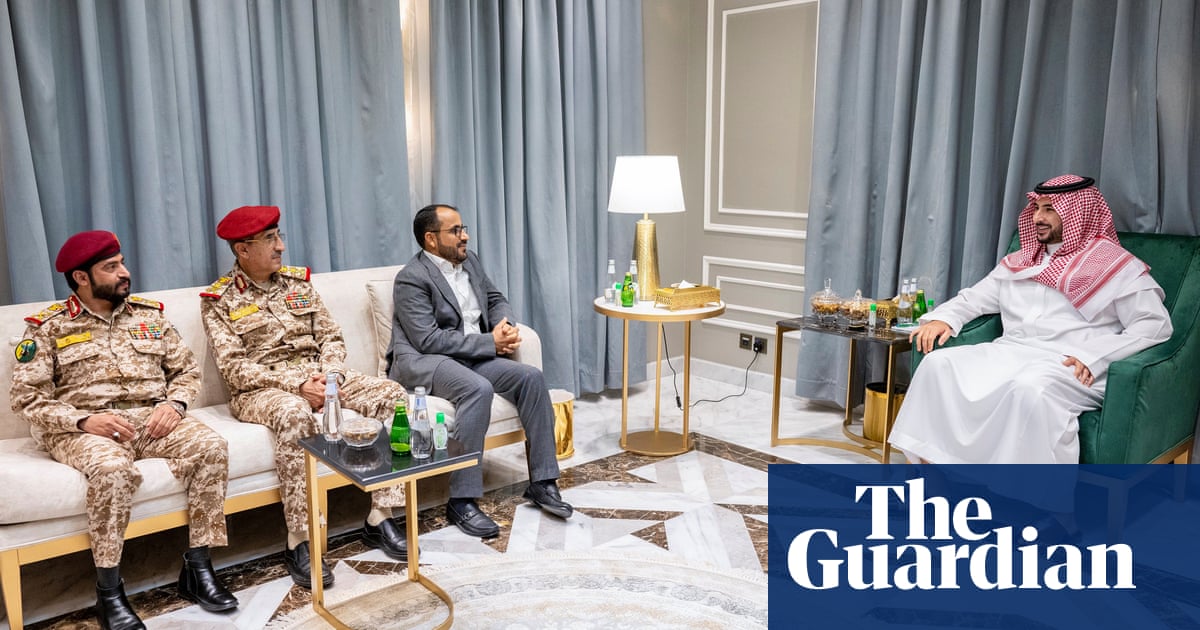
Leaders of the Southern Yemen independence movement said they have been sidelined from the critical talks held in Riyadh between Saudi Arabia and Houthi rebels on the future of Yemen. They warned any peace deal cannot be imposed upon the south, saying possible Iranian control of the strategic Bab el-Mandeb waterways was at stake.
After an unprecedented five days of meetings with the Saudi defence minister, Khalid bin Salman, Houthi leaders returned on Tuesday to their capital Sana’a saying the talks were positive. It was the first official meeting between the Saudis and Houthi rebels since the Saudi military intervention in 2015 and reflects Saudi Arabia’s determination to end the conflict.
The US secretary of state, Tony Blinken, in talks with the United Arab Emirates and Saudi Arabia on the margins of the UN general assembly in New York, has been pressing the two Gulf states to work together to secure a breakthrough. But the Emiratis, supporting the STC, fear Saudi Arabia is willing to strike almost any deal with the Houthi rebels so long as the Houthis guarantee to cease attacks, mainly drone strikes across the border between Yemen and Saudi Arabia.
But Maj Gen Aidarous Al-Zubaidi, the leader of the Southern Transitional Council (STC), the Emirati-backed group seeking the south’s independence, told the Guardian: “We have been sidelined and pushed to one side in these talks. We know about what is happening from the media.”
The STC leader was also summoned to Riyadh last week and stayed for two days without meeting the Saudi negotiators, he said.
In New York for the first time as an integral member of the Yemen government’s official delegation, Al-Zubaidi said Houthi demands, including the opening of roads and ports, and the payment of salaries to Houthi-appointed civil servants, were all being made in the context of a presumed united Yemen.
Asked about reports that Saudi is proposing 80% of revenues in the south would go to the Houthis and all foreign forces would be asked to leave Yemen, he said: “Only the south can decide about the south’s resources. Giving revenues from the south to the Houthis undermines our right to self-determination.”
Al-Zubaidi said existing oil revenues were currently not enough to pay the salaries of the Yemen government in the south: “If it is not enough for us, how can it be possible to share the revenues with the north?”
Al-Zubaidi said the status quo of low-level violence was better than a bad deal and said a full Houthi ceasefire had to precede negotiations. He argued if the outstanding civil servant salaries were paid on behalf of the Houthis and all ports opened before a ceasefire, the Houthis’ “blackmail” would have succeeded.
He also rejected the withdrawal of Arab coalition forces.
In a sign of how the southern issue is gaining international legitimacy, Al Zubaidi is in New York with the official Yemen government delegation being led by the Provisional Leadership Council (PLC) chairman, Rashad Al-Alimi.
Al Zubaidi said: “If a bad deal is struck that effectively allows a Houthi takeover, Iran through the Houthis will take control of the oilwells of the south and the Bab el-Mandeb trade route through which billions of dollars of oil flow.”
Alimi was largely anointed the PLC’s leader by the Saudis, but does not appear to have the same popular support across the south as the STC.
Yemen was only unified in 1990, but few international players apart from the United Arab Emirates have been interested in the revival of a separate southern state.
Al-Zubaidi said the humanitarian crisis is “still bordering on a catastrophe” and said the issue of independence for the south should be settled through a UN-overseen referendum, adding he wanted to see a UN peacekeeping force in Yemen to police any ceasefire and enable negotiations leading to a durable settlement.
The dispute underlines the extent to which the Yemen conflict stems from internal disputes about the direction of the country, and is not just a proxy war or the consequence of the Saudi military intervention entitled Decisive Storm in 2015.
Yemen’s war began when the Houthis descended from their strongholds in northern Yemen and seized the capital of Sana’a in 2014, forcing the internationally recognised government to flee to the south then into exile in Saudi Arabia.
Saudi Arabia has been working to dial down its regional disputes, including by restoring diplomatic relations with Iran, the country that has been doing most to support the Houthi advance.











